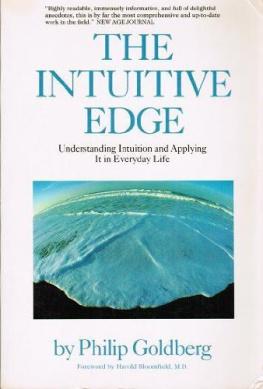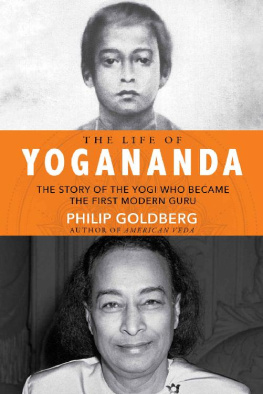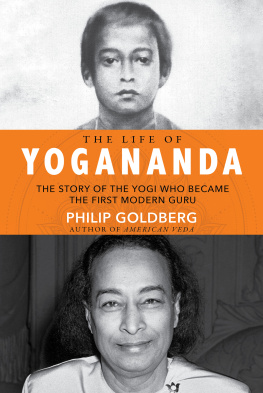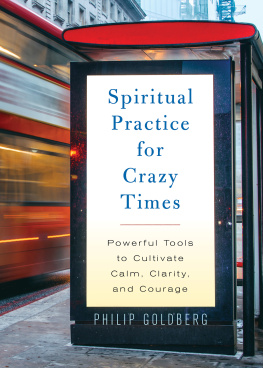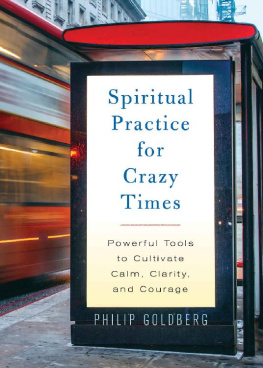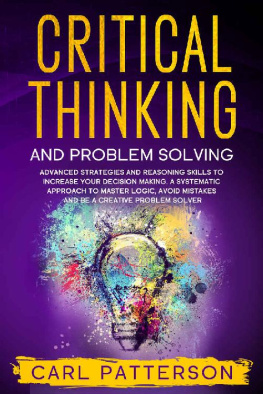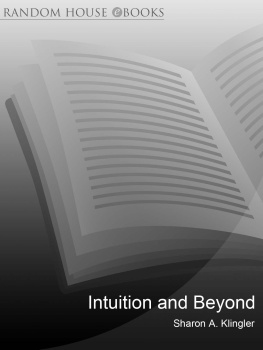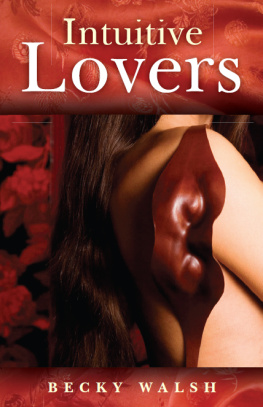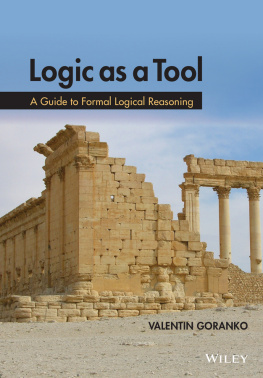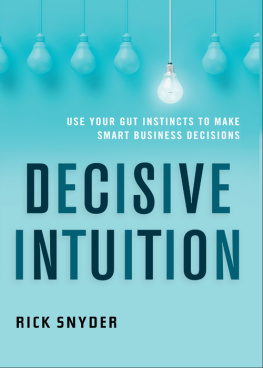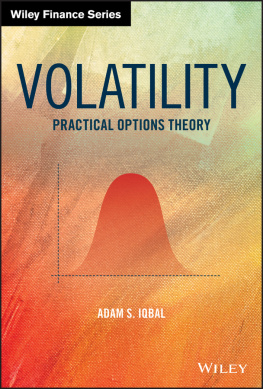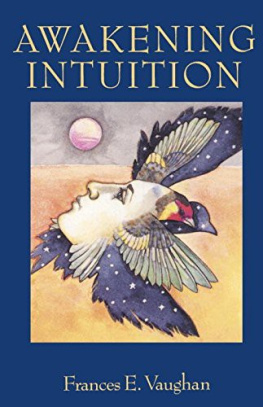THE INTUITIVE EDGE
Understanding and Developing Intuition
.
Philip Goldberg
JEREMY P. TARCHER, INC.
Los Angeles
Distributed by Houghton Mifflin Company
Boston
Library of Congress Cataloging in Publication Data
Goldberg, Philip, 1944-
The intuitive edge.
Bibliography: p. 227 Includes index.
I. Intuition I. Title.
BD181.G64 198312E3 83-9161
ISBN 0-87477-232 - X
ISBN 0-87477-344- X (ppbk.)
Copyright 1983 by Philip Goldberg
All rights reserved. No part of this work may be reproduced or transmitted in any form by any means, electronic or mechanical, including photocopying and recording, or by any information storage or retrieval system, except as may be expressly permitted by the 1976 Copyright Act or in writing by the publisher.
Requests for such permissions should be addressed to:
Jeremy P. Tarcher, Inc.
9110 Sunset Blvd.
Los Angeles, CA 90069
Illustration by Thom Dower
Manufactured in the United States of America
S 10 9 8 7 6 5 4
First Edition
Contents
Foreword 8
Preface 10
The Emergence of Intuition 15
What It Is: Definitions and Distinctions 31
The Many Faces of Intuition 45
The Intuitive Experience 63
Who Is Intuitive? 87
Right Brain, Wrong Theory 115
The Intuitive Mind 135
Getting Ready for Intuition 155
Turning Off to Tune In 173
Forgo It, or Go for It? 195
Making the World Safe for Intuition 213
References 227 Index 238
Foreword
Intuition is an essential topic whose time has come. And The Intuitive Edge is must reading for anyone who wants to live on that most delightful edge of more creativity, joy, wisdom, and inner peace.
The creative function of intuition, as Philip Goldberg defines it in this informative and useful book, stretches our capacities by introducing options, alternatives, and possibilities. Accurate intui tion also enables us to gain vital insight into ourselves and our environments, to evaluate choices, and to predict the future. It is, as Goldberg says, "a subtle guide to daily living" In short, intuition brings with it happiness, wonder, and harmony. The Intuitive Edge can help us discover the greatest therapist of allthe one that resides within.
Having worked with many thousands of clients, I no longer see my role as that of "shrink," but that of "stretch." Rather than endlessly trying to shrink problems with tranquilizers or a psychotherapeutic panacea, I am interested in stretching a person's capacitiesphysically, emotionally, socially, and spiritually. Through self-expansion and meaningful challenges, problems can be turned into opportunities for growth.
The word psychiatry comes from psyche, which refers to the spirit of a person, and iatros, which means to heal or make whole. Hence, psychiatry involves making the spirit whole. An essential tool in achieving that goal is to develop each individual's "intuitive edge . " Trusting oneselfthe ability to hear and utilize one's inner intuitive voiceis a key to self-improvement and a richer life, en abling one to convert problems into challenges and opportunities.
I sometimes humorously tell clients that the mind is the source of all mental illness. In a sense, we need to get "out of our minds" to overcome our preoccupation with problems and limitations. Trust ing our intuition can cure us of "psychosclerosis," a hardening of the mind and spirit that stems from overdependence on rationality and analysis. With good intuition we can transcend our ordinary state of mind and become more deeply and completely ourselves. For this reason, The Intuitive Edge serves as a guide to becoming more spontaneous, independent, unconventional, and free.
Philip Goldberg provides acute insight into the nature of in tuition, a valuable guide to the varieties of intuitive experience, and practical exercises to create favorable conditions for intuition to occur. An agitated, tense mind is too "noisy" for intuition to operate effectively. Techniques of meditation, yoga, breathing, muscle re laxation, and guided visualization are described to help create a more receptive and fertile mind. The book also provides other useful tips for improving your intuitive powers: for example, how to suspend judgment and listen to the inner voice, how to be flexible and playful in your thinking, how to brainstorm with free style writing. I have found these and other techniques essential in my roles of psychiatrist, author, husband, and father.
The Intuitive Edge is the very best book on the subject I've ever read. It is must reading for anyone interested in being more in novative and enterprisingthe scientist, artist, student, adminis trator, or entrepreneur. More, it is for any reader seeking im provement in his or her personal or professional life. Intuition plays a central role, for example, in choosing the right mate. Goldberg has integrated theory and practice in a well-written, clear, and imaginative way. I recommend this book highly to anyone interested in personal growth.
Harold H. Bloomfield, M.D.
Author of Making Peace with Your Parents
Preface
My interest in intuition and in the broader question of "How do we know what we know?" began in the 1960s, when I was a student questioning everything in sight. I had informally accumulated a great deal of information from a wide variety of sources when, in 1977, the idea to write a book on the subject came to me unbidden while I was riding a bicycle and trying to decide which of two apartments to move into that fall. Thus this book is an example of its own subject matter. The justification for following through on the intuitive idea was my conviction that the subject was not only interesting but of vital practical importance: what we know determines how we think, decide, and act. It does not seem unreasonable to assert that the quality of life is directly proportional to how well we go about knowing. In writing this book I was always conscious of its two threads, the theoretical and the practical, and very much aware that many readers are interested primarily in one or the other. The two themes are actually closely intertwined, both in this book and in reality. The more we know about intuition, the better equipped we are to use our own; the better our intuition, the more we are in a position to understand it. Those readers who want specifically to improve their own intuition will find that Chapters 8, 9, and 10 have a how-to orientation built on the more theoretical information in earlier chapters. The descriptive and theoretical material is also useful if applied to oneself. A stylistic explanation is in order. Like all contemporary writers, I had to decide what to do about the pronouns him, his, and he, which, when used to refer to both men and women, are considered offensive by many.
With apologies, and assurances that no sexism is implied, I opted for standard usage. In a work of this length, the alternatives become so awkward as to detract from the reader's comprehension and enjoyment.
In his 1968 book, Toward a Contemporary Psychology of Intui tion, Malcolm Westcott ended his introduction by writing, "The last word on intuition is as far in the future as the first word on intuition is in the past." Fifteen years later, I must echo the same sentiment. We are dealing with a complex and elusive subject, one that many great minds have wrestled to a draw and on which there is much disagreement. Intuition has been a peripheral subject in science, a difficult one to study even when interest is high. Hence there is not much by way of a research tradition or accepted body of knowledge. For this book I drew on philosophers both Eastern and Western, tangentially related science and scholarship, writers and artists, my own experience, and the reports of people in all walks of life. Many of the ideas found here, therefore, must be regarded as conjectural, speculative, and inferential. I hope they will stimulate others to expand and develop our knowledge of intuition, and that the book will help others obtain more time and resources for research than I was able to devote.

